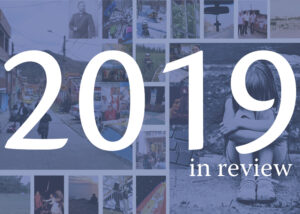Beware of pulling up the crop with the weeds
Re: “Author, bookstore owner dispute ‘censorship’ claim,” June 7, page 21.
Censorship versus freedom of speech is a hot topic in the news and, rather than debate thoughtfully about it, we’ve again chosen to quarrel. Censorship, as in the silencing of contrary voices, is everywhere. It’s just that the threshold of what and what kind of speech and writing is ban-worthy shifts in time.
Hull’s is correct; it has the right to sell what it wishes without explanation. Freedom of conscience is also a human right, and Friesen’s book is readily available to anyone looking for it.
In general, I’d be wary of attempting to silence even the most objectionable voices, on the principle that perversity condemns itself. Jesus warned us about pulling up weeds while the crop is growing, lest we destroy the good plants in so doing (Matthew 13:24-30). The way to “censor” bad news is not to drive it out of sight, but to overwhelm it with good news.
I guess it’s the skill of telling wheat from weeds that every farmer, and every Christian, needs to be taught.
—George G. Epp (online comment)
‘Abuse of power’ more accurate than ‘sexual misconduct’
Re: “Investigations reveals misconduct by influential Mennonite leader,” June 7, page 24.
Thank you, Mennonite Church Eastern Canada and Mennonite Central Committee for apologizing for the long delay in accountability and publicly recording the harms stemming from Frank H. Epp’s abuse. This progress in applying ethical standards to Mennonite leaders is a welcome reprieve from generations of institutional leaders protecting sexual offenders and enabling further abuse.
As the Mennonite church continues to learn how best to prevent and respond to sexual abuse, it is important that statements such as these identify “abuse of power” instead of relying on the more vague term “sexual misconduct.” The term “sexual misconduct” enables some people lacking understanding of sexual abuse to imply that what occurred was simply extramarital affairs.
The term “abuse of power” more accurately reflects the vast research on the topic of sexual abuse that recognizes offenders are often people with significant institutional power who coerce and manipulate people who are often much younger and without institutional power. Abuses of power are fundamentally distinct from consensual sexual affairs. Church institutions need to do more to help educate the church about sexual abuse as an abuse of power, not simply an “affair.”
—Lisa Schirch (online comment)
Church places people on pedestals, then tears them down
Re: “Investigation reveals misconduct by influential Mennonite leader,” June 7, page 24.
I am responding to this article regarding the alleged sexual misconduct of an influential Mennonite leader.
Does the public have to open the pages of Canadian Mennonite and see an article with an accompanying picture, humiliating another person accused of sexual misconduct? What was the motivation behind publishing this information 35 years posthumously?
What was it that the church did not adequately address when it was first brought to their attention in the 1990s, after the death of the accused person.
The public does not need to know any of the details except whether it was consensual at the time.
There are innocent living family members of the deceased who will experience pain and anguish as a result of this. I believe this requires a public apology on the part of the editor and the parties who provided the editor with this information for the purpose of publication.
The patriarchal and hierarchical system that is endorsed by the Mennonite church is responsible for the problem of sexual abuse. It places people on pedestals, expecting more from them than from “ordinary people.” When they show us that they are fallible human beings, we destroy the pedestal and allow them to come tumbling down, forever tainted. In days gone by, they would hang people in the public square for their transgressions. Now we hang them psychologically and emotionally.
Trauma related to sexual abuse is serious, but the present method of dealing with it will not be conducive to healing, nor will it reduce the incidence. There are positive approaches that can be taken to address problematic sexual behaviours. What needs to be published is how the problem is being addressed and how it will help to bring an end to these traumatic situations.
—Susanna Klassen, Toronto
Farmers need to ‘really begin to listen’ too
Re: “Germinating conversations,” June 7, page 16.
Growing food is complex. Climate change, biotechnology, animal welfare, animal health, soil conservation, herbicides, pesticides, subsidies, supply management, trade, supply chains, grocery store codes of ethics, food affordability, food availability, food safety, food choice, human nutrition, human health and consumer demands are some of the subjects that make it complex. Each of these could be a germinating conversation on its own.
For almost 40 years, I have been having germinating conversations almost daily with farmers and people working at growing food. I have been fortunate to have these conversations at the kitchen tables of backyard egg farmers in the Philippines, in the dining halls of Hutterite colonies in Western Canada and in the boardrooms of big farmers in the midwest United States.
What I find and hear is far from repulsive. For the most part, these farmers have a deep respect for their land and their animals, and a genuine concern for the complex issues of growing food. I also find that when I have these discussions with people who are not involved in growing food, I must continually “check” my bias, to ensure that I am open and listening.
I do agree with Will Braun that polarization is perhaps the greatest threat, and that dialogue is essential, but his sarcastic and irrelevant comments—“swaggered off in their shiny 4X4s,” and “the topic of their all-inclusive winter getaways won’t come up”—only serves to increase polarization and discourage dialogue.
I am happy to see that Braun appreciates the incredible privilege he has in choosing his lifestyle and how he grows his food. Many people in the world do not have that choice. Maybe the key to his frustration is to let go of his bias of farmers and how food is grown and really begin to listen.
—Mark Peters, Winnipeg










Leave a Reply
You must be logged in to post a comment.